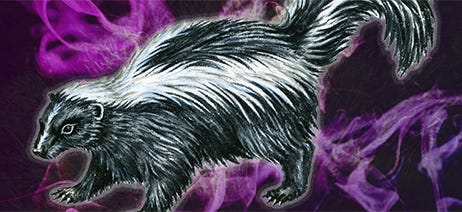
What Does Marijuana Smell Like?
There is no question that marijuana has a distinctive smell. Some people attribute it to a skunky aroma, others say it smells like gasoline. But why does it smell like that? In this guide, we’re answering all of your burning questions, including:
- What is the Famous Marijuana Smell?
- Why Does Marijuana Smell Skunky?
- What Impacts Marijuana Smell?
- Does All Cannabis Smell Like Skunk?
- What is “Skunk Weed”?
What is the Famous Marijuana Smell?
Since the 1970s, the smell of marijuana (especially during decarboxylation or the heating of the cannabis) has been called skunky. This is not necessarily because it smells like a skunk–rather it’s because it can be quite pungent. Marijuana has evolved over the last few decades, and growers have created hybrid strains with all sorts of natural aromas. While at one time, we might have just said that marijuana has a skunky smell, now, we can say that it completely depends on the strain. Marijuana can be earthy, pungent, sweet, citrusy, and so much more.
Why Does Marijuana Smell Skunky?
This may surprise you, but scientists have been asking this exact question for years, and we’ve only recently figured out the reason. If you’ve read our guide on terpenes, you know that they are a huge part of why marijuana gets the scent and flavor that it has. Terpenes are what give roses their sweet perfume, rosemary its gentle bite, and mint its sweet tang. They are also what make the strains Fruity Pebbles taste like a bowl of cereal and Lemon Haze smell like a glass of lemonade.
But what about those skunky, stinky notes we know are common with marijuana? Well, scientists know that there are these things called volatile sulfur compounds (VSCs). We find them in skunk spray, the hops that goes in your beer, and even garlic. They cause that pungent, sulfur-like odor. So researchers started to examine cannabis plants to see if VSCs could be in them—and they discovered that, sure enough, numerous novel VSCs contribute to the scent of marijuana. There’s a lot of science that goes into the types and concentrations of VSCs that cause the skunky smell, but it looks to be mainly attributed to VSC3 and, in certain situations, VSC5.
What Impacts Marijuana Smell?
There are two factors that impact marijuana’s aroma: terpenes, which are made in the plant’s trichomes, and VSCs. We are only recently becoming more aware of the impact of VSCs on the scent of marijuana, but we have known for some time that terpenes play a large role in how cannabis plants (and other plants) smell.
The compounds, whether in indica or sativa, can contribute to a whole variety of unique aromas, including rose, lemon, diesel fuel, citrus, basil, and more, but many of them have earthy undertones too thanks to the VSCs.
Does All Cannabis Smell Like Skunk?
No, not all cannabis smells like skunk, but most cannabis will have some undertones you may recognize as a familiar marijuana odor. This is because multiple factors affect the scent of marijuana, including the terpenes and the VSCs. Many breeders try to create strains with sweet or unique (we’re looking at you, Sour Diesel) aromas which can play a large part in what you experience as a consumer. When researching your strains, you can typically find the flavor and aroma of the strain, but if you’re in doubt, never hesitate to ask one of the expert budtenders at your local dispensary.
What is “Skunk Weed”?
In the United States, in the 1970s, the slang term “skunk weed” was given to marijuana–not necessarily because it smells like skunk, but because burning cannabis can be, well, stinky. This term, though, has evolved over the last 50 years. For example, in the UK, the term “skunk” refers to highly potent cannabis. In the US, if you went into a dispensary and asked for “skunk weed,” you’re not going to get a budtender to take you to the stinkiest cannabis on the shelf. Rather, they will guide you to some of the most popular strains on the market—Skunk #1 and the cannabis plants that descend from it. While Skunk #1 and the strains that came from it may have earned their place for their pungent aromas, they are now known around the world amongst both growers and cannabis enthusiasts for much more than their smell.
Learn More About Cannabis Smells
The scent of cannabis is so popular that there are candle and perfume lines dedicated to our favorite fan-leafed plant, but it’s hard to know what you’re going to like until you experience it for yourself. The best way to do this is by visiting your local dispensary. There, you can work with the budtenders to learn more about the different scents of cannabis and decide which ones you find most appealing. Of course, if you prefer no scent at all, there are cannabis products like distillates that are available too.


